The Hong Kong government is keen to take a big bite of the global asset management pie, and with its new law on limited partnership funds it is showing serious intent to lure alternative funds away from their homes in offshore jurisdictions and Singapore, and anchor them in the city. Mithun Varkey reports
The Hong Kong government has taken a firm step towards preserving and reaffirming its position as a global financial hub with the passing of the Hong Kong Limited Partnership Fund Ordinance (LPFO).
The ordinance, effective from 31 August 2020, is an important step in attracting close-ended funds to domicile in the city and away from offshore jurisdictions, which has been the default model for most fund managers.
The new law allows fund managers to set up limited partnership funds (LPFs) in Hong Kong. The LPF regime follows the open-ended fund companies (OFC) regime, which came into effect on 30 July 2018, providing the option for Hong Kong-domiciled, open-ended investment funds to be structured in a corporate form, rather than as unit trusts, which has been the conventional structure followed for more than a century.
The LPFO regime is a registration scheme that allows a variety of alternative asset classes such as private equity funds, venture capital funds, real estate funds, infrastructure funds, funds of funds, family offices and even hedge funds to be domiciled in Hong Kong.
“LPFO is part of a series of building blocks put in place by the government in the last couple of years to anchor funds in Hong Kong,” says Anson Law, a senior manager in the market development division of the Hong Kong Monetary Authority (HKMA), who has been spearheading the legislation.
“We realized that a lot of funds in Asia are domiciled offshore, especially in the Cayman Islands, and most of them are using the Cayman model because they don’t have an option, and we thought it makes sense to get a [piece of the] pie of this business for Hong Kong,” he says.
“Hong Kong has capital under management of about US$160 billion, and 565 private equity and venture capital fund managers as of the end of last year. If the offshore model is not going to work in a few years, then either these fund managers will be forced to move to other jurisdictions, and we will lose this offshore fund business completely. So the idea is to attract new business as well as retain the existing business.
“The first thing we did was to expand fund-level tax exemption provided to offshore funds to onshore funds as well under the unified profits tax exemption rule put in place in 2019, extending the tax exemption to all funds regardless of where they are managed from. And now, with LPF, we provide a channel for a general partner (GP) to set up a vehicle in Hong Kong similar to the Cayman Exempted Limited Partnership (ELP) vehicle, which is essentially a pooling vehicle.”
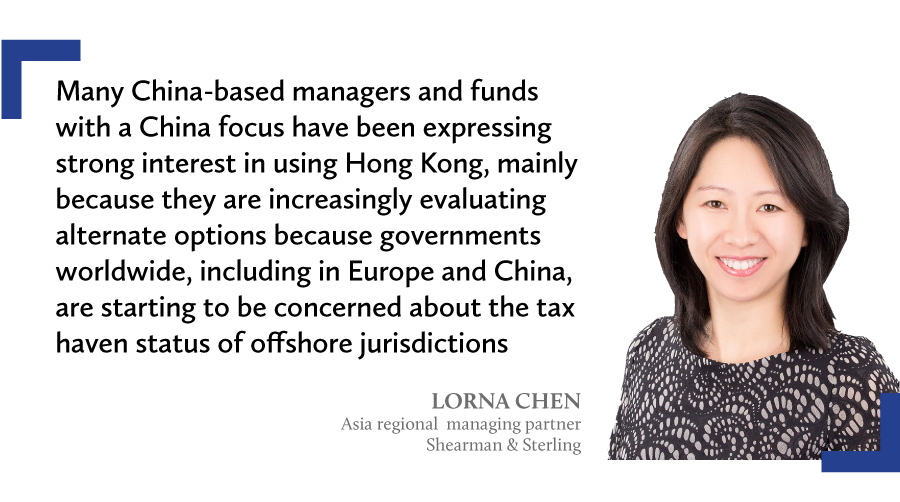
“Hong Kong, unfortunately, did not have a partnership law that can be used by the private equity and venture capital industry. The LPFO makes Hong Kong an option for the industry, especially in the larger global environment of moving financial products onshore to avoid discussions about tax evasion and shell companies.”
Mark Uhrynuk, corporate and securities partner at Mayer Brown in Hong Kong, says the LPFO modernises and significantly improves the legal framework for setting up and operating private investment funds in Hong Kong. “It is an essential step to filling a gap in Hong Kong’s regime for private equity fund formation, and the asset management industry more generally,” says Uhrynuk. “Combined with the recently enacted unified funds tax exemption, this initiative allows Hong Kong to capitalise on the global offshore-onshore shift.”
“The LPFO certainly has come at the right time,” adds Fiona Fong, a partner at Deacons in Hong Kong. “Just two years ago, we had the OFC and now we’ve LPFO, so it completes the picture in terms of fund structures. While most of the hedge fund managers may be more familiar with the company structure, when it comes to PEs they prefer to use limited partnerships, and so this law adds the last [piece of the] puzzle to the fund structure spectrum.”
The advantage of the bill is its contractual flexibility and simplified procedures, says River Stone, a partner and co-head of China practice group at Tanner De Witt in Hong Kong. “The new LPF Ordinance provides significant contractual flexibility and simplified procedures,” he says.
“Notably, the partnership agreement is not required to be submitted to the Companies Registry, or be made public, and the registration of the fund is administered by the Companies Registry of Hong Kong, which in general will not inspect or regulate the internal operation of an LPF, and the identities of the limited partners will not be registered with the Companies Registry and not be public information, and also the fund will be entitled to apply for the fund tax concession.” Stone expects it will be an incentive for private equity players to choose Hong Kong as their new home.
Fong says the Hong Kong structure work very similarly to the Cayman structure. “Some basic things, like limited liability for limited partners, unlimited liability for GPs, safe harbours for activities limited partners undertake without losing their limited liability status, are the same,” she says. “It won’t be difficult for them to understand, because it is just the same as they are used to in the Caymans. I guess the advantage [of the LPFO] is that it is much cheaper in terms of incorporation and operating costs.”
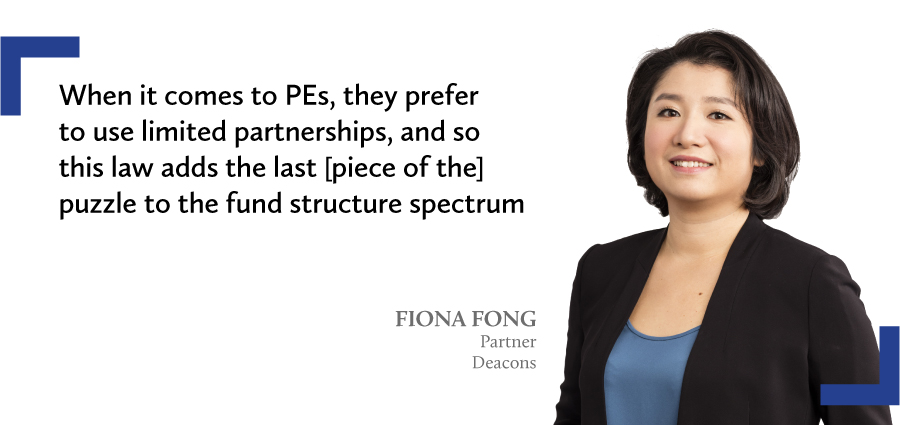
Onshore advantage
A key driver for Hong Kong’s LPF legislation is the growing pressure on offshore jurisdictions like Cayman Islands from governments, including the EU and the Organization for Economic Co-operation and Development (OECD), to tighten their regulations. Cayman Islands was added to the EU’s blacklist of non-co-operative jurisdictions for tax purposes, effective from 18 February 2020, due to its delay in enacting relevant legislation.
“There is a growing demand for combating tax avoidance and heightened requirements for economic substance,” says Florence Yip, partner and Asia-Pacific asset and wealth management tax leader at PwC in Hong Kong.
“Hong Kong offers an alternative to fund managers considering onshore structures, and the key difference in Hong Kong is the real people running the funds, involved in all the allied functions such as investment managers and advisers, fund administrator, etc.,” she says.
Uhrynuk says fund managers who used to establish their funds in offshore jurisdictions without “economic substance” are now potentially subject to regulatory challenges and/or administrative/defensive measures imposed by EU member states.
“We also see investors resisting or refusing to invest through fund vehicles established in the Cayman Islands, and also Mauritius and the British Virgin Islands,” he says, adding, “… there is a trend for more onerous compliance requirements to be imposed on offshore private equity funds, which likely will lead certain fund managers to revisit fund structures, and consider moving funds and business activities back onshore.”
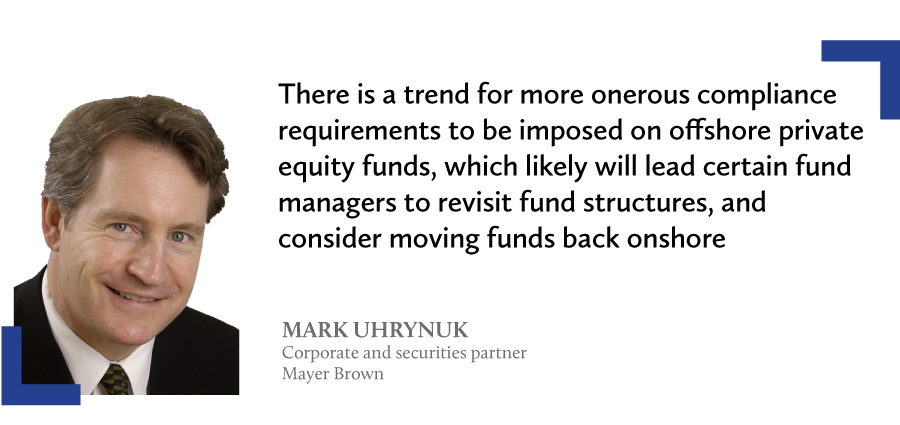
“Cayman Islands’ economic substance law in January 2019 had carve-outs for investment funds and and their special purpose companies holding investments,” says Yip. “However, as per the latest requirements, all close-ended funds domiciled there require to be registered with the Cayman Islands Monetary Authority (CIMA) and be audited there. Earlier, books of funds could be audited where the fund managers were based, now there will be an additional audit.”
Fong, from Deacons, says: “Compared to Cayman, the difference is that if you are a Hong Kong fund, then the requirement is that you have to prepare an annual audit. But for Cayman, since now all types of funds will have to be CIMA registered, you’ll have to find a Cayman auditor to prepare the audit for you.
“So, you need to have a team locally to work on the audit itself, and then you’ll need another team based in Cayman to sign off on the audit. So then it comes to two layers.”
Hong Kong, interestingly, also has more relaxed regulatory controls compared with competing jurisdictions like Singapore, and other requirements like registration and renewal are cheaper than in the Cayman Islands. Singapore, though, has had a head start. Its limited partnership legislation is more than a decade old.
“The tax regime in Singapore relies on MAS [Monetary Authority of Singapore] approval,” says Law. “We understand from practitioners that the business plan and fund manager have to be reviewed by the MAS. They will talk to you in terms of what your business goals are, and what AUM [assets under management] targets do you envisage on day one, and then each year they will come to you to review that and check whether you meet them, and you will enjoy tax exemption subject to meeting this.
“However, in Hong Kong, we set everything into law and related guidelines transparently, so fund managers don’t need to get prior approvals for exemptions. It is an honour-based system. In our legislation, we make it explicit in the law that whether you have an SFC [Securities and Futures Commission] licence or not, you are still able to enjoy the benefits.”
Stone, from Tanner De Witt, adds that, “… in general, the regulatory control in Singapore is stricter than Hong Kong, which means less freedom in the operation of the fund.”
Singapore has a minimum economic substance requirement, which mandates that funds spend a minimum amount of money – about S$250,000 (US$183,000) by way of rent, expenses or salaries – in Singapore every year to be eligible for tax exemptions. The Hong Kong regime does not have such a requirement.
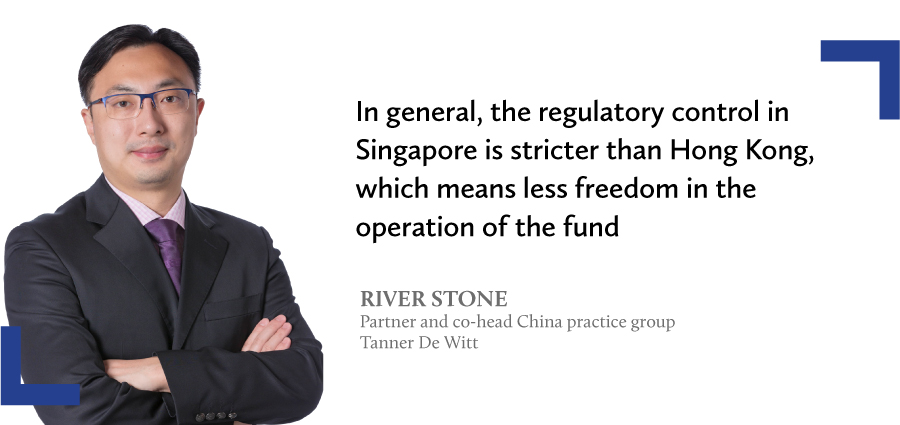
However, Chen says any new law that comes into the market won’t see people just jump on it. “They have to evaluate and feel comfortable,” she says. “The LPs can push and kick, and say they don’t like Cayman, but they need an alternative. But the alternative has to be stable and there has to be certainty. Sponsors and investors have to be comfortable with the legal system and political system.”
So, the question is, who is going to be the first to use the Hong Kong LPFO?
“There are basically two schools of fund managers – China-focused fund managers and international managers – who invest in the region and rest of the world, and that are based in Asia,” says Chen. “The first wave [to use Hong Kong LPF regime] would be Chinese managers.
“For many managers of China-focused funds, the management team is based in Hong Kong or mainland China, and limited partners (LPs) are from China, or it is a club deal with Chinese investors. They want inexpensive, quick and convenient structures, and for such fund managers or sponsors Hong Kong will quickly become the choice. The proximity to China is an important factor.
“Companies in China have been familiar with Hong Kong for many years now, be it through Hong Kong IPOs, or through Cayman companies investing into China through Hong Kong Using Hong Kong would be more convenient because the fund terms can be similar. There is one less layer of compliance burden.”
On the international side, Chen says it’s more of a wait and see. “They are glad that Hong Kong is an alternative, and obviously onshore is good, but is Hong Kong the choice? What about case law? There is nothing yet, because it has just started. We don’t know how courts will handle disputes within the LPF regime and how they are going to interpret the law.
“Most managers, in a down market such as now when fundraising is difficult, would want to avoid discussing such issues and answering such questions with their investors. They can just say, if you want safety and certainty, choose Cayman, end of the story. Instead of explaining why Hong Kong is safe and great.”
Missing pieces
The LPFO, however, isn’t without its holes. There are a few questions around the tax regulations, and about re-domiciliation, that the industry feels need to be addressed.
“Hong Kong has a competitive tax regime in general,” says Yip. “There is no tax on long- term capital gains, there are no sales tax or GST [goods and services tax] or VAT [value-added tax], and it is a territorial tax regime. Also, on Hong Kong profit tax, there is a two-tiered tax system, whereby the first HK$2 million (US$258,000) is taxed at a concessionary rate of 8.25% and the rest at 16.5%. The funds are profits tax exempt if the Unified Fund Exemption conditions are satisfied and transfers of limited partnership fund interests are not subject to stamp duty.”
However, she says there is definitely a need for clarity on tax on carried interest. “The problem arises because there is no carried interest taxation law in Hong Kong, and the Inland Revenue Department’s (IRD) view on this has been that carried interest is a service fee and hence taxable, but the industry maintains that it is a profit-sharing scheme and should be accorded the capital gains treatment, i.e. non- taxable.”
Law says the government has taken note of the criticism and there is a proposal to remedy it. “The IRD view was that carried interest is income in nature, and therefore taxable,” he says. “Under the current proposal, the government hasn’t defined whether carried interest should be capital gains or income. They are pooling it into a bucket and applying a tax rate without qualifying it as capital gains or income. So, this stream of income will be taxed at a highly competitive or concessionary rate, and the government is not precluding a zero rate.”
Chen says if Hong Kong could offer a competitive tax rate for carried interest, it would be viewed favourably by investors. “Singapore, in comparison, has a rate of about 10%, and if Hong Kong can offer a lower rate, that could tip the balance in its favour,” she says.
However, Fong believes that what most of the industry wants is certainty, and not necessarily zero tax. “I guess most of the managers are not looking for zero tax,” she says. “Of course, the lower the better it would be, but I guess managers are being reasonable here. And what I’ve heard is that, you know, once the tax concession is cleared, if it’s going to be compatible with Singapore jurisdiction, I guess a lot of managers are willing to move their funds back to Hong Kong.”
The success of the LPFO will likely require changes to the broader tax regime in Hong Kong, says Uhrynuk of Mayer Brown.
“Apart from addressing taxation of carried interest, given the IRD’s position on how it should be taxed, expanding the asset classes to include all investment gains made by the LPF, including treating interest income as qualifying income, as well as ensuring that any special purpose investment entities of the LPF can obtain tax residence certificates in Hong Kong, all need to be considered,” he says.
A fund established under the LPFO should not incur Hong Kong profits tax on qualifying income earned by the LPF. However, the tax treatment in the country of the investment made by the LPF will depend on whether that country will consider the LPF to be a tax resident of Hong Kong.
“As limited partnerships generally do not, under Hong Kong’s tax treaties, qualify as a tax residents of Hong Kong, the LPF generally would not enjoy the benefits of Hong Kong’s favourable tax treaties (i.e., reduced withholding taxes on dividends or interest, and avoidance of local capital gains tax when the LPF disposes of its investments),” Uhrynuk adds.
A lack of clarity around the unified tax regime is an issue that also worries Fong. “It [a unified tax regime] has its own problems because there are still bits and pieces that are quite uncertain,” she says. “For example, it’s not crystal clear under the unified tax system how interest income will be treated. That’s not a problem of the LPF structure itself, but the tax regime generally.”
Uhrynuk, however, points out that the tax residency issue can be avoided by structuring the fund as a combination of an LPF investing through a Hong Kong master holding company, which would qualify it as a Hong Kong tax resident.
Closed doors
The biggest complaint about the LPFO has been the lack of a re-domiciliation options for existing funds. The LPFO does not cater for domestication or re-domiciliation of limited partnership funds established in foreign jurisdictions.
“Without a re-domiciliation and continuance mechanism, sponsors would have to shut down original fund platforms and transfer assets held under such platforms over to the LPFO structure in Hong Kong, incurring stamp duty and affecting existing rights, thus deterring foreign funds from re-domiciling to Hong Kong,” says Uhrynuk.
Yip says: “Lack of re-domiciliation is, in my opinion, the biggest missing piece in the LPF legislation. There will be a lot of demand from offshore funds that would want to shift their domicile, and they must be given the option.”
Shearmen & Sterling’s Chen, however, says she would not advise her clients to redomicile in any event. “If you think about it, you have signed numerous contracts, and there are all sorts of limitations and prohibitions in legal contracts,” she says. “If you have completed, say, five years, and then you have another five years, why would you bother? Just keep it and use the LPFO for your new structure.
“Although there will be fund sponsors who will want to move, saying they would like the convenience of managing everything in one place and are willing to go back to their LPs to get consent. So, I think if there is enough demand from the industry, the government may consider supplementing the existing LPF Ordinance to allow it.”
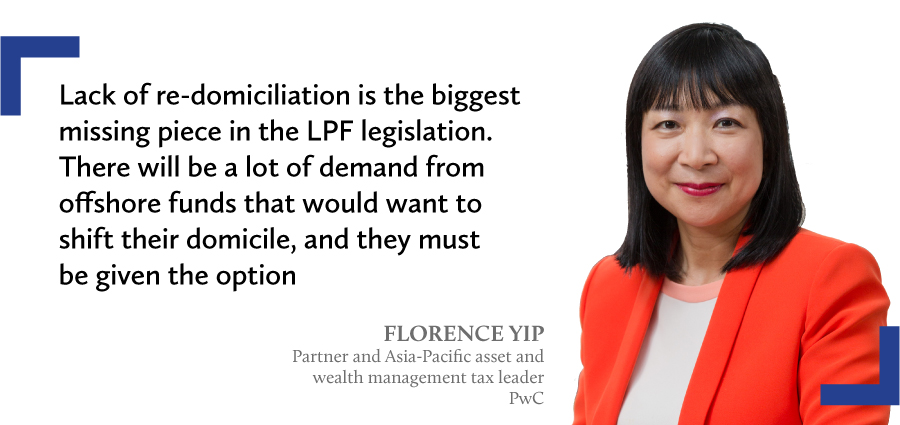
“We want to do that,” he says. “Right now, the government is waiting to see how the LPF regime is evolving, if there is good industry demand for re-domiciliation, then definitely the government can enhance the regime. I personally see the demand now. We will give our recommendation to the policymakers.”
The decision to not include a re-domiciliation clause in the original legislation was not a regulatory consideration, but a “pragmatic” one, Law says.
“When we were working on the legislation, the industry said it would be a good-to-have feature, but not compulsory, but this was before Cayman tightened its economic substance legislation,” he says. “At the time, there was not much demand from the industry, but by the time they asked for it, the legislation was half-baked, and it was hard to include it especially when a few Legislative Council meetings were cancelled due to the pandemic.”
Singapore also does not allow re-domiciliation of partnerships at the moment. However, it allows variable capital companies to re-domicile.
“Although this is also an issue under the Singapore regime, this may change,” says Uhrynuk. “The Singapore government introduced legislation to provide for the re-domiciling of foreign corporations to Singapore in late 2017, and may introduce similar reforms to enable foreign partnerships to re-domicile in a cost-efficient fashion.”
The LPFO also doesn’t allow partnerships to have a separate legal personality, thereby exposing GPs to unlimited liability – a criticism that has been raised by some in the industry.
Uhrynuk says the Financial Services and the Treasury Bureau didn’t accept recommendations from market participants that LPFs established in Hong Kong should have the option to elect to have a separate legal personality at the time of registration. “Without a separate legal personality, assets contributed to the LPF will have to be held by the GP, and registration of such assets will have to be made through the GP,” he says.
“The inability to hold assets in the name of the fund itself could adversely affect the structuring options available to private equity sponsors.”
Fong disagrees. “I don’t see an utmost need for it,” she says. “I mean, yes, that’s the difference between a company structure and limited partnership structure. But I guess it’s been widely accepted. That’s how the Cayman structure operates as well. And there are ways to ring-fence liabilities of the limited partnership. So it’s not so important.”
While Uhrynuk agrees that this issue also affects LPFs formed under the Cayman Islands Exempted Limited Partnership Law (ELPL) and the Singapore Limited Partnership Act (LPA), he says: “Notably, established fund regimes in other jurisdictions provide for separate legal personality for limited partnerships, e.g., Guernsey, the British Virgin Islands, Scotland and the US state of Delaware.”
Another criticism has been that LPFO only allowed for one GP and, therefore, co-GPs are not allowed. “A lot of Chinese sponsors want to do co-GP structures,” says Chen. “There are multiple ways for two sponsors to set up the fund and manage it together. One is for the two sponsors to become shareholders of the GP, which then manages the fund. The other is to form two separate GPs and have an agreement between the two, instead of the two becoming shareholders. The second structure is not allowed, though the first one is allowed under the LPFO.”
Chen says, however, she wouldn’t encourage the co-GP structure, because of unlimited liabilities. “One co-GP could be sued for the misdeeds of the other, because, by law, GPs bear unlimited legal liabilities, with respect to the assets of the fund, it opens the sponsors to risks.
“It is allowed in the Cayman Islands but it is not a popular structure, especially in mature markets. Chinese sponsors, though, like the co-GP structure because they want to be independent, and for reputation purposes. They would rather be a GP than the shareholder of a GP.”
Another distinguishing feature of the LPFO is the requirement to appoint: (1) a Hong Kong resident or company as an investment manager; (2) an authorized representative; and (3) an authorised or licensed person (including an accounting or legal professional) as a “responsible person” to carry out anti-money laundering/counter-terrorist financing functions for the LPF. There are no equivalent provisions under the ELPL.
“[With the ordinance] giving various professionals special roles in the LPF, for example, the responsible person must be a bank, an SFC licensed entity, accountant or lawyer. The application for registration must be submitted by a Hong Kong law firm or lawyer, and will ensure the quality of the documentation and operation of the LPF, and it also creates more business opportunities for the financial market in Hong Kong,” says Stone, of Tanner De Witt.
On balance
Although not without its faults, the Hong Kong LPFO manages to be a remarkably flexible and enabling legislation, which offers a real alternative for fund managers that are looking to be compliant with current international taxation requirements, and avoid reputational risks.
“The legislation is meant to be an alternative,” says Law. “It is carefully designed not to be exclusive, and intends to provide a level playing field. You can see from the fund-level exemption, it is not saying that only LPFs can use it – all are welcome to Hong Kong.
“Existing players, should they choose they can still use the Cayman vehicle. If they are worried about BEPS and the international environment or if they are sensitive to global investors’ generally reduced appetite out of reputational considerations to invest through offshore structures, they have the option to move to Hong Kong.”
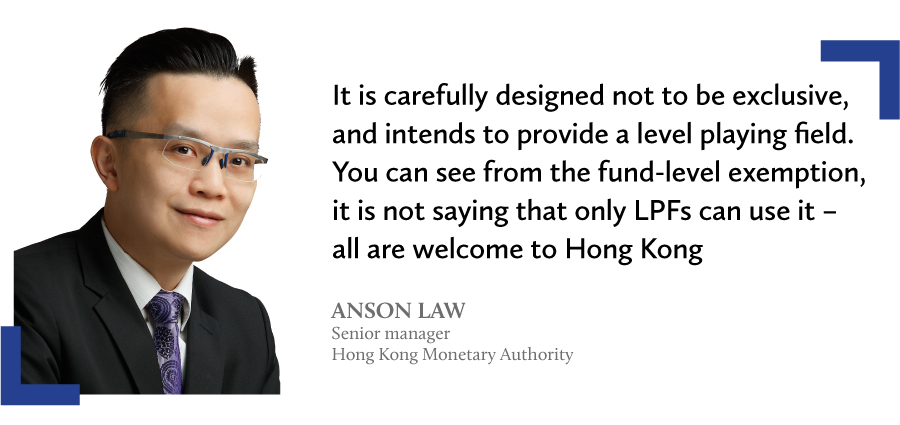
“For fund managers, it is all in one place, your team is here, you can now do your decision making in Hong Kong without worrying about tax implications. However, I wish that we could have re-domiciliation flexibility, co-GP flexibility – it is a matter of choice and clients should be given the option to choose.”
Uhrynuk says that while the LPFO represents a very important first step, Hong Kong may need to be more liberal and innovative in its approach to distinguish itself from Singapore, particularly for asset managers focusing on Southeast Asia with existing operations in Singapore.
“The cost-saving, compliance and governance benefits of not having to operate and manage a fund structure across multiple jurisdictions could drive fund sponsors to centralise structures in a location where they have an existing operating presence and substance,” he says. “Accordingly, Hong Kong’s efforts to develop itself as an asset management hub, and as a platform for private equity, are timely, particularly as these efforts relate to capturing mainland China opportunities both inbound and outbound.”
Fong cautions that when fund managers are choosing or structuring a fund, they need to go back to the basics. “Once the fund domicile is decided, when you are looking to choose a structure that is suitable for your fund, you should go back to consider how familiar your investors are with different structures,” she says. “People say that you shouldn’t reinvent the wheel, and that’s really true.”


























